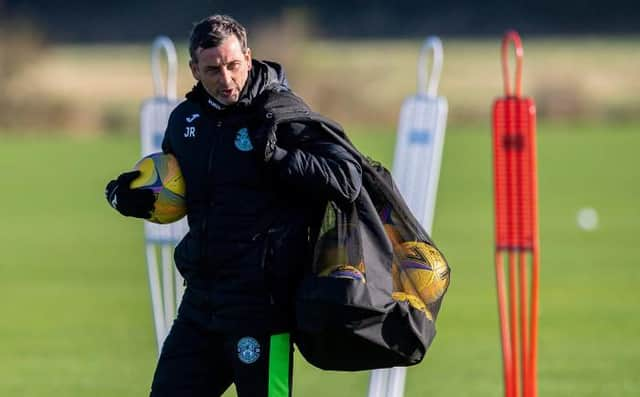How Steve Kean will help Jack Ross shrink Hibs' first team pool with new development squad


Welcoming the arrival of former Blackburn Rovers manager Steve Kean as the club’s new academy director, and his plans to bridge the gap between the U-18s and the first team, the Easter Road boss said that a more steady supply of talent immediately underneath the first team is vital to help the club move forward.
“It's the only way it's sustainable,” said Ross, who has made no secret of his preference for a smaller, tight-knit squad, where there is still competition for places but enough scope for everyone to get a chance, avoiding the spread of dissatisfaction in the ranks. It also allows him to spend more on each of his players.
Advertisement
Hide AdAdvertisement
Hide Ad“In fairness to Ben [Kensell, chief executive] and Ron [Gordon, Hibs’ chairman and owner], we've consulted and had conversations about it, and the flip side is that you just make your first-team bigger, but to do that it costs and it's not always conducive to the best environment. And then you block the pathway because the more players I put in my first-team group, the more difficult it is for younger players to come through.
“However, as a manager, I'm ultimately judged on winning first-team games, and to stay true I need a group below that I can go to when I need them.
“We have an under-18 team doing well but they're super young. Sometimes they come to training and they're not at that level. And that's not a case of me not wanting to give them an opportunity, because I've already done that at this club, we just have too big a gap at the moment.
“So in order for us to have a small first-team squad, we need that group to be where we need them to be.
Advertisement
Hide AdAdvertisement
Hide Ad“It can be a hybrid of our own academy players and others who we've signed after being released from other clubs, ones from overseas with the potential to improve and those, such as Daniel MacKay, who we've convinced the likes of Ben and Ron to invest money in, to bring them to the club, because we believe we can make a return and turn them into international players, like Kevin Nisbet.
“But to be able to continue to do that, we need a place for them to be.”
At the moment those who have moved beyond the U-18 but have struggled to make their mark in first team training have been sent out on loan to toughen up mentally and physically in match situations. While there are strategic partnerships there remains a fairly wide dispersal of Hibs young talent, which Ross says is not always helpful.
“The opportunity for players to go out on loan is vitally important and will remain so. However, the way we do it can't be scattergun.
Advertisement
Hide AdAdvertisement
Hide Ad“When you send them all out on loan they can't train together, or very rarely train together, and never play together.
“With out under-18s at the minute, we made a conscious decision to try and keep the bulk of them together so they can learn and improve together as a tighter group.
“There will come a time for those players to go out on loan depending on the stage of their development but, certainly for now, the idea is to have this group who train together, work together and play together far more frequently and they then become a mirror image of the first team.”
The moulding of a development squad, filling the void left by the former reserve league sides, will see Kean working closely with Ross but the fact they have dovetailed so well when working together on the Scottish FA coaching programmes, means they already trust each other’s work. And, rather than feel threatened by Kean’s background as a manager in his own right, in England and abroad, Ross says it is a major plus.
Advertisement
Hide AdAdvertisement
Hide Ad“Absolutely. Understanding of the challenges of being a first-team player is important. It's the X-factor, if you like and it's the hardest thing to identify in a young player with any certainty.
“Any one of us can identify a good player from watching a game at academy level, but dealing with crowd pressure, expectation, the increased physicality, the demands of the first-team, these are all things you only get an appreciation of when you work with first-team players on a regular basis. Steve's experiences in that regard will be invaluable.
“The best example to speak about is Josh Doig. He's got the attributes, the athleticism, to be a really good, modern-day attacking full-back and he's shown that in his career progression. But what you can't know until you put them in that environment is their mentality, mindset and strength of mind. That's something Josh has shown incredibly well since he came into the team.
“For me, that last part is the most difficult to measure and predict, but usually the one which separates the average from the very good and the very good from the absolutely exceptional.”
Advertisement
Hide AdAdvertisement
Hide AdAnd, with relatively inexperienced coaches working around him, knowing that he has an ally in Kean alos pleases Ross.
“His experiences will also help my coaching team as well. I've got young coaches that I'm always challenging to get better and having someone else in the building we can discuss things with is undoubtedly a benefit to us going forward.”
Message from the editor
Thank you for reading this article. If you haven't already, please consider supporting our sports coverage with a digital sports subscription.